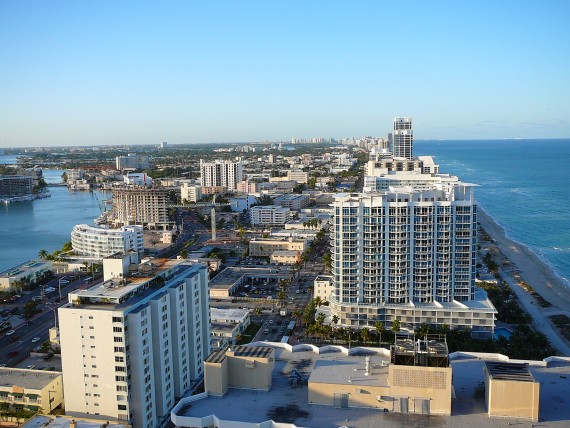The Miami Beach City Commission on Friday agreed to extend a moratorium on demolitions in the city’s North Beach neighborhood as well as establish conservation districts and one local historic district as part of ongoing plans to revitalize the area that stretches from 63rd Street to 87th Terrace and between the Atlantic Ocean and Biscayne Bay.
In a sometimes contentious debate, commissioners and Mayor Philip Levine approved several motions that they said aimed to strike a balance between preserving the area’s iconic MiMo architecture and building resiliency to cope with sea-level rise.
A current moratorium on demolitions will be extended for six months beginning in January and the commission instructed the city’s planning department to initiate plans for a conservation overlay district for much of North Beach.
Conservation districts have specific design guidelines for new buildings that include limits on lot size and scale, but demolitions would not be prohibited once the six-month moratorium lapses. The commission also agreed to create a local historic district along the south shore of Normandy Isle but it decided not to establish a local historic district along the Tatum Waterway which preservationists have long advocated. Demolitions are largely prohibited in local historic districts.
Commissioner John Elizabeth Alemán told The Real Deal that the properties along the Tatum Waterway are in the lowest lying area of the city and that so-called King tides in October were the highest on record. “The water is already cresting over the tops of sea walls and penetrating across properties to the street so these are very low-lying buildings. And because many are one-story I would argue that there is already a hardship there,” said Alemán, who said creating a conservation district for the area would “preserve the character and the style of the area but still add resilience.”
But Kirk Pascal a local neighborhood activist who owns and lives in a four-plex along the Tatum told TRD that recent infrastructure improvements such as adding pumps and better drainage in the area have helped mitigate water issues and now many historic structures will be at risk. “Seventy-percent of the structures on the Tatum are designated as contributing to the National Register and the area should not have been sacrificed without proper analysis that could have been included to finalize the designation,” Pascal said.
Much of North Beach has been embroiled for years in preservation issues. Last year preservationists successfully blocked the construction of a high-rise along Ocean Terrace, although revised plans submitted this year will allow a lower-scaled version of the project to go forward.
A 189-page master plan from town planners Dover Kohl submitted this year to the city called for the creation of two local historic districts: one along the Tatum and the other which was approved on Friday on Normandy Isle. But critics of the master plan, like Matis Cohen, who owns a number of buildings along the Tatum Waterway, said it did not adequately address how sea-level rise would affect many of the old buildings.
Cohen said on Friday he was encouraged that the city is now “having an honest discussion about resiliency and how the city will meet the demands of sea level rise.” Still, he said he has concerns about the city’s plans for an overlay conservation district for much of the area. “I’m concerned [that] instead of creating efficiencies and incentives, it’s another nice way of saying further restrictions and disincentives. Only time will tell, because there are so many unknowns,” he told TRD.
Friday’s developments are just the latest measures taken to revitalize North Beach this year. Several months ago commissioners agreed to raise height limits along 71st Street and parts of 72nd Street to allow new buildings for a “town center” for North Beach, and they recently approved a short-term rental district along Harding Avenue that supporters say will allow many small older economically unviable MiMo buildings to be preserved.
